by
Mark Mallett
Note: if you are looking for Part 2 of my response to Jimmy Akin, see here.
The popular Catholic apologetics website known as “Catholic Answers” has published an article by Jimmy Akin that examines the content of Countdown to the Kingdom. Readers have asked us to respond to his critique that questions our claims that the “Timeline” on this website is based on four principal sources: (1) the Church Fathers, (2) magisterial teachings of popes, (3) the apparitions at Fatima, and (4) a “prophetic consensus” of credible seers. On the Church Fathers, Mr. Akin claims that “Countdown to the Kingdom has selected its preferred points of interpretation while ignoring others”; that the “Magisterial teachings on prophecy are minimal, and the popes have not provided teachings supporting the Countdown timeline”; that the interpretation of Fatima “offered by the Magisterium holds that it dealt with events in the twentieth century, not events in our future”; and that the seers providing a “prophetic consensus” of the aforementioned are not “approved” and therefore are unreliable. “In view of these facts,” says Mr. Akin, “I consider Countdown to the Kingdom to be a website that presents a highly sensationalistic, speculative, and unlikely prophetic scenario that is put together from scattered pieces of information and interpretations that the authors favor.”
While I have never personally dialogued with Jimmy Akin, I have the highest regard for his work in apologetics and have nothing but praise overall for Catholic Answers. I spent several days in Rome with their Senior Apologist, Tim Staples, as we discussed everything from the Pope to private revelation. If you are new to the Catholic Faith, I wholly encourage you to explore their website and seek answers to your questions on Catholic fundamentals.
- A recurring theme — if not the predominant exhortation — of this website is that the faithful should have no fear of the times ahead. Whoever contacted Mr. Akin expressing fear as a result of this website must have read very little of its contents. We addressed this false assertion in A Response to Patrick Madrid, another contributor to Catholic Answers.
- Neither Countdown to the Kingdom (CTTK) nor any of its current or past contributors have ever said or implied that the end of the world is imminent. Each, on the contrary, has repeatedly and specifically said the opposite.
- The “prophetic consensus” of private revelation — on impending Chastisements and a glorious Era of Peace to follow — is testified to repeatedly throughout over a century of Papal Magisterium. For Mr. Akin to refer to this Magisterium as “scant” or as “not supporting the Countdown Timeline” is simply untrue.
- There is a strong consensus among the Church Fathers on the timeline of events, contrary to what Mr. Akin asserts.
- Fr. Michel Rodrigue’s messages, as well as those of Fr. Stefano Gobbi, are not condemned by the Church; these are facts, not “implausible” assertions.
The Timeline
At issue in much of Mr. Akin’s article is the Timeline posted on CTTK. Contrary to his assumption that it is “put together from scattered pieces of information and interpretations”, it is directly lifted from a straightforward reading of Chapters 19 – 20 of Revelation and precisely how several Church Fathers explained it. This same Timeline is laid out in my book The Final Confrontation, which received the Nihil Obstat in 2020.
The Timeline is also self-evident that the “end of the world” is not imminent, as Mr. Akin seems to think we are saying. No one or any message here has said as much in our videos, books, and a multitude of posts. However, Heaven has repeatedly told us that we have been living in a “time of mercy” and that “time is short” as we approach the end of this era. Take the approved messages to St. Faustina, for example:
Speak to the world about My mercy; let all mankind recognize My unfathomable mercy. It is a sign for the end times; after it will come the day of justice. While there is still time, let them have recourse to the fount of My mercy. —Jesus to St. Faustina, Divine Mercy in My Soul, Diary, n. 848
And again,
You will prepare the world for My final coming. —Jesus to St. Faustina, Divine Mercy in My Soul, Diary, n. 429
…hear the voice of the Spirit speaking to the whole Church of our time, which is the time of mercy. —POPE FRANCIS, Vatican City, March 6th, 2014, www.vatican.va
Pope Benedict puts Faustina’s message into perspective:
If one took this statement in a chronological sense, as an injunction to get ready, as it were, immediately for the Second Coming, it would be false. —POPE BENEDICT XVI, Light of the World, A Conversation with Peter Seewald, p. 180-181
As the successor to Peter explains in the same interview as well as other statements, there is yet to come, for example, the “Triumph of the Immaculate Heart.” In fact, contrary to Mr. Akin’s assertion in his article that the events of Fatima are confined to the past century, Benedict XVI stated:
…we would be mistaken to think that the prophetic mission of Fatima is complete. —Homily, May 13th, 2010, Fatima, Portugal; Catholic News Agency
But what does the “Triumph of the Immaculate Heart” mean? According to Benedict (who then went on to pray for the hastening of “the fulfillment of the prophecy of the triumph of the Immaculate Heart of Mary”), it is…
…equivalent in meaning to our praying for the coming of God’s Kingdom… —Light of the World, p. 166, A Conversation With Peter Seewald
Eight years before, the Marian pope, St. John Paul II, prayed for the same:
This is our great hope and our invocation, ‘Your Kingdom come!’—a Kingdom of peace, justice and serenity, which will re-establish the original harmony of creation. —ST. POPE JOHN PAUL II, General Audience, November 6th, 2002, Zenit
Herein lies the hermeneutical key to understanding the Timeline, indeed, the Scriptures themselves: the coming of the Kingdom as understood here is not the end of the world, as many evangelical preachers presume and even some Catholic authors have proposed. Rather, it is the fulfillment of the “Our Father” in which the Divine Will is to reign “on earth as it is in Heaven.”[1]cf. The Coming Descent of the Divine Will In some circles of Catholic theology, this is known as an “Era of Peace”. Cardinal Mario Luigi Ciappi, papal theologian for Pius XII, John XXIII, Paul VI, John Paul I, and John Paul II stated:
Yes, a miracle was promised at Fatima, the greatest miracle in the history of the world, second only to the Resurrection. And that miracle will be an era of peace, which has never really been granted before to the world. —October 9th, 1994, The Apostolate’s Family Catechism, p. 35
Cardinal Raymond Burke explains why:
…in Christ is realized the right order of all things, the union of heaven and earth, as God the Father intended from the beginning. It is the obedience of God the Son Incarnate which reestablishes, restores, the original communion of man with God and, therefore, peace in the world. His obedience unites once again all things, ‘things in heaven and things on earth.’ —Cardinal Raymond Burke, speech in Rome; May 18th, 2018; lifesitnews.com
When Christ’s perfect obedience becomes ours, then the Our Father will be fulfilled on earth:
…every day in the prayer of the Our Father we ask the Lord: “Thy will be done, on earth as it is in heaven” (Matt 6:10)…. we recognize that “heaven” is where the will of God is done, and that “earth” becomes “heaven”—i.e., the place of the presence of love, of goodness, of truth and of divine beauty—only if on earth the will of God is done. —POPE BENEDICT XVI, General Audience, February 1st, 2012, Vatican City
The Messages and Messengers
Mr. Akin states,
The [Countdown] website does not show evidence that the authors have conducted detailed investigations of the seers they recommend or, if they have, that they properly applied critical thinking to their cases and objectively weighed the evidence.
On the contrary, our translator Peter Bannister, MTh, MPhil has studied hundreds of seers throughout the world, interviewed some, and read thousands of pages of prophetic revelations. He is perhaps one of the most versed theologians on private revelation in our times. I have also personally interviewed some the seers on this website, often positing difficult questions. We have also published numerous articles here or linked to our own websites explaining how the Church discerns prophecy and teaches us to approach it: for example, see Prophecy in Perspective. I can also testify that there are often vigorous and rich theological debates behind the scenes and frequent discussions on the best wording chosen in a translation, as languages do not always commute perfectly between each other. We have also provided a biographical page of each seer providing their ecclesiastical status and other pertinent information. In other words, we take St. Paul’s admonitions to “test prophecy” seriously rather than “despise” it (cf. 1 Thessalonians 5:20-21).
Mr. Akin further asserts that we have chosen seers who are not approved by the Church. On the contrary, nearly every seer here has some form of ecclesiastical approval to one degree or another: the seers of Heede, Germany (approved); Luz de Maria (writings approved); Alicja Lenczewska (Imprimatur); Jennifer (endorsed by the late Fr. Seraphim Michaelenko and after submission to John Paul II, a Vatican representative told her to “Spread the messages to the world any way you can”); St. Faustina (approved); Pedro Regis (broad support from his bishop); Simona and Angela (active theological commission); seers of Medjugorje (first seven apparitions approved by the Ruini Commission; awaiting final word from the Pope); Marco Ferrari (met with several popes; still under a theological commission); Servant of God Luisa Piccarreta (full approval); Fr. Stefano Gobbi (Imprimatur); Elizabeth Kindelmann (approved by Cardinal Péter Erdő); Valeria Copponi (supported by the late Fr. Gabriel Amorth; no official declaration); Fr. Ottavio Michelini was a priest and mystic (member of the Papal Court of Pope St. Paul VI); Servant of God Cora Evans (approved)… and there are more.
However, Mr. Akin’s argument that a seer should only be considered believable if they are “approved” is not supported by either Scripture or Church teaching. For one, the Magisterium can sometimes take decades if not centuries to make any formal judgment on private revelation – if at all. Second, St. Paul’s instructions to the Christian community on prophecy were not that complex:
Two or three prophets should speak, and the others discern. But if a revelation is given to another person sitting there, the first one should be silent. For you can all prophesy one by one, so that all may learn and all be encouraged. Indeed, the spirits of prophets are under the prophets’ control, since he is not the God of disorder but of peace. (1 Cor 14:29-33)
While this can often be practiced on the spot regarding the regular exercise of prophecy in a community, when supernatural phenomena are accompanied, a deeper investigation by the Church into the supernatural character of such revelations may be necessary. This may or may not take some time.
Today, more than in the past, news of these apparitions is diffused rapidly among the faithful thanks to the means of information (mass media). Moreover, the ease of going from one place to another fosters frequent pilgrimages, so that Ecclesiastical Authority should discern quickly about the merits of such matters.
On the other hand, modern mentality and the requirements of critical scientific investigation render it more difficult, if not almost impossible, to achieve with the required speed the judgments that in the past concluded the investigation of such matters (constat de supernaturalitate, non constat de supernaturalitate) and that offered to the Ordinaries the possibility of authorizing or prohibiting public cult or other forms of devotion among the faithful. — Sacred Congregation for the Doctrine of the Faith, “Norms Regarding the Manner of Proceeding in the Discernment of Presumed Apparitions or Revelations” n. 2, vatican.va
It is also clear that Heaven doesn’t wait for canonical investigations. Usually, God provides sufficient evidence for belief in messages that are especially intended for a larger audience. Hence, Pope Benedict XIV said:
Are they to whom a revelation is made, and who are certain it comes from God, bound to give a firm assent thereto? The answer is in the affirmative… —Heroic Virtue, Vol III, p.390
As for the rest of the Body of Christ, he goes on to say:
He to whom that private revelation is proposed and announced, ought to believe and obey the command or message of God, if it be proposed to him on sufficient evidence… For God speaks to him, at least by means of another, and therefore requires him to believe; hence it is, that he is bound to believe God, Who requires him to do so. —Ibid. p. 394
Regarding two seers specifically, Mr. Akin states:
Fr. Rodrigue also predicted that a series of dramatic, apocalyptic events—including a Third World War, the martyrdom of Pope Francis, and an ecumenical council being called by Pope Emeritus Benedict—would begin in October 2020.
There have been many erroneous statements on websites, including in a letter from his bishop, that Fr. Michel made such claims. On the contrary, in a letter to his supporters dated March 26, 2020, Fr. Michel simply wrote the following:
My dear people of God, we are now passing a test. The great events of purification will begin this fall. Be ready with the Rosary to disarm Satan and to protect our people. Make sure that you are in the state of grace by having made your general confession to a Catholic priest. The spiritual battle will begin. Remember these words: The month of the Rosary will see great things. —www.countdowntothekingdom.com/new-video-the-truth-about-fr-michel-rodrigue-is-fr-michel-rodrigue-authentic
I confirm to you that, by the great Jubilee of the year two thousand, there will take place the triumph of my Immaculate Heart, of which I foretold you at Fatima, and this will come to pass with the return of Jesus in glory, to establish his Reign in the world. Thus you will at last be able to see with your own eyes the new heavens and the new earth. —To The Priests, Our Lady’s Beloved Sons, U.S. National Headquarters of the MMP [1995], n. 532
And again in message 389 given in 1988:
In this period of ten years there will come to completion that fullness of time which was pointed out to you by me… In this period of ten years there will come to completion the time of the great tribulation, which has been foretold to you in Holy Scripture, before the second coming of Jesus. In this period of ten years the mystery of iniquity, prepared for by the ever-increasing spread of apostasy, will become manifest. In this period of ten years all the secrets which I have revealed to some of my children will come to pass and all the events which have been foretold to you by me will take place.
Mr. Akin then links to an article on Catholic Answers that wrongly and grievously casts Fr. Gobbi’s writings into heresy. We direct you to a letter by the former Director of the MMP that accurately explains the theology of Fr. Gobbi’s writings that are consistent with the Church Fathers and their theological development. See: “In Defense of the Orthodoxy of The Marian Movement of Priests”.
As for Fr. Gobbi’s predictions above, have these prophecies, which continue to reflect what is unfolding in our times, simply been delayed as we have seen occur even in the Scriptures (eg. Jonah 3:10)? Or did Fr. Gobbi interject his own thoughts somehow and simply get it wrong?
Such occasional occurrences of flawed prophetic habit should not lead to the condemnation of the entire body of the supernatural knowledge communicated by the prophet, if it is properly discerned to constitute authentic prophecy. —Dr. Mark Miravalle, Private Revelation: Discerning With the Church, page 21
Indeed, the spiritual director to both Servant of God Luisa Piccarreta and the seer of La Salette, Melanie Calvat, warned:
Conforming to prudence and sacred accuracy, people cannot deal with private revelations as if they were canonical books or decrees of the Holy See… For example, who could ratify in full all the visions of Catherine Emmerich and St. Brigitte, which show evident discrepancies? —St. Hannibal, in a letter to Fr. Peter Bergamaschi who had published all the unedited writings of Benedictine mystic, St. M. Cecilia
However, perhaps Our Lady herself offered an explanation in Fr. Gobbi’s messages:
This is what I want to tell you. Do not, therefore, limit yourselves to the predictions which I give you, seeking to understand the times you are living in. As a Mother, I am telling you about the dangers you are facing, the threats which are hanging over you, the evils which could befall you, only because this evil can still be avoided by you, the dangers can be escaped, the design of God’s Justice, can still be changed by the power of His merciful Love. Even when I foretell punishment to you, remember that everything can be changed in a moment by the power of your prayer and of your penance, which makes reparation. So do not say “What you foretold to us did not come true!”, but thank the Heavenly Father with me because, through the response of prayer and consecration, through your suffering, through the immense suffering of so many of my poor children, He has again put off the time of Justice, to allow the time of great Mercy to flower. —January 21st, 1984; To the Priests, Our Lady’s Beloved Sons
Here again, there has been no formal decree against Fr. Gobbi’s writings. A secretary from the Congregation for the Doctrine of the Faith (CDF), in a “personal and unofficial letter”, advised Fr. Gobbi that the CDF considered his writings to be “private meditations.”[3]See: “In Defense of the Orthodoxy of The Marian Movement of Priests” However, to this day, there is no formal documentation to verify any such decision by the Congregation.
On the Church Fathers
Mr. Akin asserts that…
…the Church Fathers did not inherit a single interpretation of the book of Revelation. There were very few commentaries written on it in the patristic period, views on the book diverged widely, and Countdown to the Kingdom has selected its preferred points of interpretation while ignoring others.
The evidence is quite the opposite, actually. The Church Fathers most affirmatively did not “diverge widely” on their view of the proper interpretation of the Book of Revelation. Almost all of them believed firmly that it promised “the times of the kingdom” on earth, within history, during its final “millennium” – before Christ’s final coming in the flesh. It is precisely through this interim “coming of the Kingdom” that the Church will be sanctified and prepared so that Our Lord Jesus “might present to himself the church in splendor, without spot or wrinkle or any such thing, that she might be holy and without blemish” (Eph 5:27). Another term for this Era of Peace[4]cf. The Era of Peace: Snippets from Private Revelation is a “middle coming” of Christ in Spirit:
Whereas people had previously spoken only of a twofold coming of Christ—once in Bethlehem and again at the end of time—Saint Bernard of Clairvaux spoke of an adventus medius, an intermediate coming, thanks to which he periodically renews His intervention in history. I believe that Bernard’s distinction strikes just the right note… —POPE BENEDICT XVI, Light of the World, p.182-183, A Conversation With Peter Seewald
This is what St. Bernard said:
Because this [middle] coming lies between the other two, it is like a road on which we travel from the first coming to the last. In the first, Christ was our redemption; in the last, he will appear as our life; in this middle coming, he is our rest and consolation.…. In his first coming Our Lord came in our flesh and in our weakness; in this middle coming he comes in spirit and power; in the final coming he will be seen in glory and majesty… —St. Bernard, Liturgy of the Hours, Vol I, p. 169
Indeed, the Early Church Fathers frequently spoke of a coming “sabbath rest” for the Church.[5]cf. The Coming Sabbath Rest In fact, they claimed that this period of rest for the Church, the “times of the kingdom”, as Irenaeus called them,[6]Adversus Haereses, Irenaeus of Lyons, V.33.3.4, The Fathers of the Church, CIMA Publishing Co. were precisely the “thousand years” spoken of by St. John after the death of the Antichrist or “beast”.
Scripture says: ‘And God rested upon the seventh day from all His works’… And in six days created things were completed; it is evident, therefore, that they will come to an end at the sixth thousand year [after Adam]… But when The Antichrist shall have devastated all things in this world, he will reign for three years and six months, and sit in the temple at Jerusalem; and then the Lord will come from Heaven in the clouds… sending this man and those who follow him into the lake of fire; but bringing in for the righteous the times of the kingdom, that is, the rest, the hallowed seventh day… These are to take place in the times of the kingdom, that is, upon the seventh day… the true Sabbath of the righteous… Those who saw John, the Lord’s disciple, [tell us] that they heard from him how the Lord taught and spoke about these times… —St. Irenaeus of Lyons, Church Father (140–202 A.D.); Adversus Haereses, Irenaeus of Lyons, V.33.3.4, The Fathers of the Church, CIMA Publishing Co.; (St. Irenaeus was a student of St. Polycarp, who knew and learned from the Apostle John and was later consecrated bishop of Smyrna by John.)
Irenaeus is referring to Church Father Papias, who was a disciple of St. John according to the Vatican’s own documentation:
Papias by name, of Herapolis, a disciple dear to John… copied the Gospel faithfully under John’s dictation. —Codex Vaticanus Alexandrinus, Nr. 14 Bibl. Lat. Opp. I., Romae, 1747, p.344
And St. Justin Martyr wrote:
A man among us named John, one of Christ’s Apostles, received and foretold that the followers of Christ would dwell in Jerusalem for a thousand years, and that afterwards the universal and, in short, everlasting resurrection and judgment would take place…. Now… we understand that a period of one thousand years is indicated in symbolic language. —St. Justin Martyr, Dialogue with Trypho, Ch. 81, The Fathers of the Church, Christian Heritage
This “seventh day” is not eternity but this interim “coming of the Kingdom” before the eternal “eighth day”:
…when His Son will come and destroy the time of the lawless one and judge the godless, and change the sun and the moon and the stars—then He shall indeed rest on the seventh day… after giving rest to all things, I will make the beginning of the eighth day, that is, the beginning of another world. —Letter of Barnabas (70-79 A.D.), written by a second century Apostolic Father
Again, Mr. Akin suggests that we are cherry-picking the Fathers in this regard. He is no doubt referring to the oft-cited quotation of St. Augustine who claimed that the “thousand years” in Revelation 20 is “an equivalent for the whole duration of this world.” However, Augustine was explicit that this was his personal opinion “…so far as occurs to me…”.[7]De Civitate Dei “City of God”, Book 20, Ch. 7 In fact, Augustine gave three interpretations to this passage, including one that was fully consonant with previous Church Fathers while avoiding the heresy of millenarianism,[8]see Millenarianism – What it is and is Not which taught that Jesus would return in the flesh to reign on earth during these “times of the kingdom.” Instead, said both Tertullian[9]Adversus Marcion, Ante-Nicene Fathers, Henrickson Publishers, 1995, Vol. 3, pp. 342-343 and Augustine, this would be a period of “spiritual blessings”:
…as if it were a fit thing that the saints should thus enjoy a kind of Sabbath-rest during that period, a holy leisure after the labors of six thousand years since man was created… (and) there should follow on the completion of six thousand years, as of six days, a kind of seventh-day Sabbath in the succeeding thousand years… And this opinion would not be objectionable, if it were believed that the joys of the saints, in that Sabbath, shall be spiritual, and consequent on the presence of God… —St. Augustine of Hippo (354-430 A.D.; Church Doctor), De Civitate Dei, Bk. XX, Ch. 7, Catholic University of America Press
Neither does this fulfillment of the “Our Father”, which Servant of God Luisa Piccarreta calls “the gift of living in the Divine Will”, constitute the definitive fulfillment of the Kingdom of God…
…since the idea of a definitive intra-historical fulfillment fails to take into account the permanent openness of history and of human freedom, for which failure is always a possibility. —Cardinal Ratzinger (POPE BENEDICT XVI) Eschatology: Death and Eternal Life, Catholic University of America Press, p. 213
Indeed, as the Scriptures indicate, after this “thousand years”, which the Church Fathers also called “the Day of the Lord”,[10]cf. Scripture – The Day of the Lord there is one last final revolt (Rev 20:7-10) — Gog and Magog, who are a type of the Beast and False Prophet who assaulted the Church before the Era of Peace.
We shall indeed be able to interpret the words, “The priest of God and of Christ shall reign with Him a thousand years; and when the thousand years shall be finished, Satan shall be loosed out of his prison;” for thus they signify that the reign of the saints and the bondage of the devil shall cease simultaneously… so in the end they shall go out who do not belong to Christ, but to that last Antichrist… —St. Augustine, The Anti-Nicene Fathers, City of God, Book XX, Chap. 13, 19
The kingdom will be fulfilled, then, not by a historic triumph of the Church through a progressive ascendancy, but only by God’s victory over the final unleashing of evil, which will cause his Bride to come down from heaven. God’s triumph over the revolt of evil will take the form of the Last Judgment after the final cosmic upheaval of this passing world. —Catechism of the Catholic Church, n. 677
Hence, the website Countdown to the Kingdom exists to exhort souls to pray for and prepare for these final eschatological events, which may or may not culminate completely within in our lifetimes.
Why not ask him to send us new witnesses of his presence today, in whom he himself will come to us? And this prayer, while it is not directly focused on the end of the world, is nevertheless a real prayer for his coming; it contains the full breadth of the prayer that he himself taught us: “Your kingdom come!” Come, Lord Jesus! —POPE BENEDICT XVI, Jesus of Nazareth, Holy Week: From the Entrance into Jerusalem to the Resurrection, p. 292, Ignatius Press
This gospel of the kingdom will be preached throughout the world as a witness to all nations, and then the end will come. (Matthew 24:14)
On Magisterial Authority
Mr. Akin claims in his article that:
Magisterial teachings on prophecy are minimal, and the popes have not provided teachings supporting the Countdown timeline. They only provide teachings about points common to every orthodox Catholic view of prophecy (e.g., there will be a Second Coming).
The evidence couldn’t be more contrary. First, consider the words of John Paul II shortly before being raised to the seat of Peter:
We are now standing in the face of the greatest historical confrontation humanity has gone through… We are now facing the final confrontation between the Church and the anti-Church, of the Gospel versus the anti-Gospel, of Christ versus the anti-Christ… It is a trial… of 2,000 years of culture and Christian civilization, with all of its consequences for human dignity, individual rights, human rights and the rights of nations. —Cardinal Karol Wojtyla (JOHN PAUL II ), at the Eucharistic Congress, Philadelphia, PA; August 13, 1976; cf. Catholic Online (confirmed by Deacon Keith Fournier who was in attendance)
In none of John Paul II’s teachings does he ever suggest the “end of the world” is at hand. He, too, anticipated the coming of the Kingdom in a new modality, what he called a “coming new and divine holiness”,[11]‘God himself had provided to bring about that “new and divine” holiness with which the Holy Spirit wishes to enrich Christians at the dawn of the third millennium, in order to “make Christ the heart of the world.”’ —Address to the Rogationist Fathers, n. 6 a “new Springtime” or “new Pentecost”.[12]“As the third millennium of the Redemption draws near, God is preparing a great springtime for Christianity and we can already see its first signs.” May Mary, the Morning Star, help us to say with ever new ardor our “yes” to the Father’s plan for salvation that all nations and tongues may see his glory.” —POPE JOHN PAUL II, Message for World Mission Sunday, n.9, October 24th, 1999; www.vatican.va Summarizing Sacred Tradition, nineteenth-century writer Fr. Charles Arminjon (1824-1885) stated:
…if we study but a moment the signs of the present time, the menacing symptoms of our political situation and revolutions, as well as the progress of civilization and the increasing advance of evil, corresponding to the progress of civilization and the discoveries in the material order, we cannot fail to foresee the proximity of the coming of the man of sin, and of the days of desolation foretold by Christ… The most authoritative view, and the one that appears to be most in harmony with Holy Scripture, is that, after the fall of the Antichrist, the Catholic Church will once again enter upon a period of prosperity and triumph. —The End of the Present World and the Mysteries of the Future Life, Fr. Charles Arminjon (1824-1885), p. 56-58; Sophia Institute Press
From Leo XIII to the present Pope, they have consistently spoken in terms that indeed indicate both the coming trials as well as triumph.
There is a great uneasiness at this time in the world and in the Church, and that which is in question is the faith. It so happens now that I repeat to myself the obscure phrase of Jesus in the Gospel of St. Luke: ‘When the Son of Man returns, will He still find faith on the earth?’…I sometimes read the Gospel passage of the end times and I attest that, at this time, some signs of this end are emerging. —POPE PAUL VI, The Secret Paul VI, Jean Guitton, p. 152-153, Reference (7), p. ix.
…he who resists the truth through malice and turns away from it, sins most grievously against the Holy Ghost. In our days this sin has become so frequent that those dark times seem to have come which were foretold by St. Paul, in which men, blinded by the just judgment of God, should take falsehood for truth, and should believe in “the prince of this world,” who is a liar and the father thereof, as a teacher of truth: “God shall send them the operation of error, to believe lying (2 Thess. ii., 10). In the last times some shall depart from the faith, giving heed to spirits of error and the doctrines of devils” (1 Tim. iv., 1). —POPE LEO XIII, Divinum Illud Munus, n. 10
When all this is considered there is good reason to fear lest this great perversity may be as it were a foretaste, and perhaps the beginning of those evils which are reserved for the last days; and that there may be already in the world the “Son of Perdition” of whom the Apostle speaks. —POPE ST. PIUS X, E Supremi, Encyclical On the Restoration of All Things in Christ, n. 3, 5; October 4th, 1903
Certainly, those days would seem to have come upon us of which Christ Our Lord foretold: “You shall hear of wars and rumours of wars—for nation shall rise against nation, and kingdom against kingdom“ (Matt 24:6-7). —POPE BENEDICT XV, Ad Beatissimi Apostolorum, November 1, 1914
And thus, even against our will, the thought rises in the mind that now those days draw near of which Our Lord prophesied: “And because iniquity hath abounded, the charity of many shall grow cold” (Matt. 24:12). —POPE PIUS XI, Miserentissimus Redemptor, Encyclical on Reparation to the Sacred Heart, n. 17
Like Pius X, he too foresaw, particularly in the spread of Communism, foreshadowings of the coming of Antichrist:[13]see Antichrist… Before the Era of Peace?
These things in truth are so sad that you might say that such events foreshadow and portend the “beginning of sorrows,” that is to say of those that shall be brought by the man of sin, “who is lifted up above all that is called God or is worshiped” (2 Thes 2:4). —Miserentissimus Redemptor, Encyclical Letter on Reparation to the Sacred Heart, May 8th, 1928
Here, we are providing a fraction of the magisterial statements on our present times: see Why Aren’t the Popes Shouting?
On the coming Triumph, magisterial and ecclesiastical teaching are not lacking either.
…a hope in some mighty triumph of Christ here on earth before the final consummation of all things. Such an occurrence is not excluded, is not impossible, it is not all certain that there will not be a prolonged period of triumphant Christianity before the end… If before that final end there is to be a period, more or less prolonged, of triumphant sanctity, such a result will be brought about not by the apparition of the person of Christ in Majesty but by the operation of those powers of sanctification which are now at work, the Holy Ghost and the Sacraments of the Church. —The Teaching of the Catholic Church: A Summary of Catholic Doctrine [London: Burns Oates & Washbourne, 1952] p. 1140
Your divine commandments are broken, your Gospel is thrown aside, torrents of iniquity flood the whole earth carrying away even your servants… Will everything come to the same end as Sodom and Gomorrah? Will you never break your silence? Will you tolerate all this for ever? Is it not true that your will must be done on earth as it is in heaven? Is it not true that your kingdom must come? Did you not give to some souls, dear to you, a vision of the future renewal of the Church? —St. Louis de Montfort, Prayer for Missionaries, n. 5; ewtn.com
Out from the mournful groans of sorrow, from the very depths of the heart-rending anguish of oppressed individuals and countries there arises an aura of hope. To an ever-increasing number of noble souls there comes the thought, the will, ever clearer and stronger, to make of this world, this universal upheaval, a starting point for a new era of far-reaching renovation, the complete reorganization of the world. —POPE PIUS XII, Christmas Radio Message, 1944
[John Paul II] does indeed cherish a great expectation that the millennium of divisions will be followed by a millennium of unifications… that all the catastrophes of our century, all its tears, as the Pope says, will be caught up at the end and turned into a new beginning. —Cardinal Joseph Ratzinger (POPE BENEDICT XVI), Salt of the Earth, An Interview With Peter Seewald, p. 237
After purification through trial and suffering, the dawn of a new era is about to break. —POPE ST. JOHN PAUL II, General Audience, September 10, 2003
God loves all men and women on earth and gives them the hope of a new era, an era of peace… The Great Jubilee is inseparably linked to this message of love and reconciliation, a message which gives voice to the truest aspirations of humanity today. —POPE JOHN PAUL II, Message of Pope John Paul II for the Celebration of the World Day of Peace, January 1, 2000
But even this night in the world shows clear signs of a dawn that will come, of a new day receiving the kiss of a new and more resplendent sun… A new resurrection of Jesus is necessary: a true resurrection, which admits no more lordship of death… In individuals, Christ must destroy the night of mortal sin with the dawn of grace regained. In families, the night of indifference and coolness must give way to the sun of love. In factories, in cities, in nations, in lands of misunderstanding and hatred the night must grow bright as the day, nox sicut dies illuminabitur, and strife will cease and there will be peace. —POPE PIUX XII, Urbi et Orbi address,March 2nd, 1957; vatican.va
May there dawn for everyone the time of peace and freedom, the time of truth, of justice and of hope. —POPE JOHN PAUL II, Radio message, Vatican City, 1981
“And they shall hear my voice, and there shall be one fold and one shepherd.” May God… shortly bring to fulfillment His prophecy for transforming this consoling vision of the future into a present reality… It is God’s task to bring about this happy hour and to make it known to all… When it does arrive, it will turn out to be a solemn hour, one big with consequences not only for the restoration of the Kingdom of Christ, but for the pacification of… the world. We pray most fervently, and ask others likewise to pray for this much-desired pacification of society. —POPE PIUS XI, Ubi Arcani dei Consilioi “On the Peace of Christ in his Kingdom”, December 23, 1922
Oh! when in every city and village the law of the Lord is faithfully observed, when respect is shown for sacred things, when the Sacraments are frequented, and the ordinances of Christian life fulfilled, there will certainly be no more need for us to labor further to see all things restored in Christ… And then? Then, at last, it will be clear to all that the Church, such as it was instituted by Christ, must enjoy full and entire liberty and independence from all foreign dominion… “He shall break the heads of his enemies,” that all may know “that God is the king of all the earth,” “that the Gentiles may know themselves to be men.” All this, Venerable Brethren, We believe and expect with unshakable faith. —POPE PIUS X, E Supremi, Encyclical “On the Restoration of All Things”, n.14, 6-7
Again, these are just a fraction of the statements made by the Magisterium. See The Popes, and the Dawning Era and Dear Holy Father… He is Coming!.
We hope this response will continue the cordial dialogue between us and Jimmy Akin, especially as the Catholic world is shrinking and unity in the Body of Christ is more threatened than ever.
Do not despise the words of prophets,
but test everything;
hold fast to what is good…
(1 Thessalonians 5:20-21)
Footnotes
| ↑1 | cf. The Coming Descent of the Divine Will |
|---|---|
| ↑2 | In a letter of clarification to Bishop Gilbert Aubry, Archbishop Tarcisio Bertone of the Congregation for the Doctrine of the Faith wrote: “What Bishop Peric said in his letter to the Secretary General of “Famille Chretienne”, declaring: “My conviction and my position is not only ‘non constat de supernaturalitate,’ but likewise, ‘constat de non supernaturalitate‘ [not supernatural] of the apparitions or revelations in Medjugorje”, should be considered the expression of the personal conviction of the Bishop of Mostar which he has the right to express as Ordinary of the place, but which is and remains his personal opinion.” —May 26, 1998; ewtn.com |
| ↑3 | See: “In Defense of the Orthodoxy of The Marian Movement of Priests” |
| ↑4 | cf. The Era of Peace: Snippets from Private Revelation |
| ↑5 | cf. The Coming Sabbath Rest |
| ↑6 | Adversus Haereses, Irenaeus of Lyons, V.33.3.4, The Fathers of the Church, CIMA Publishing Co. |
| ↑7 | De Civitate Dei “City of God”, Book 20, Ch. 7 |
| ↑8 | see Millenarianism – What it is and is Not |
| ↑9 | Adversus Marcion, Ante-Nicene Fathers, Henrickson Publishers, 1995, Vol. 3, pp. 342-343 |
| ↑10 | cf. Scripture – The Day of the Lord |
| ↑11 | ‘God himself had provided to bring about that “new and divine” holiness with which the Holy Spirit wishes to enrich Christians at the dawn of the third millennium, in order to “make Christ the heart of the world.”’ —Address to the Rogationist Fathers, n. 6 |
| ↑12 | “As the third millennium of the Redemption draws near, God is preparing a great springtime for Christianity and we can already see its first signs.” May Mary, the Morning Star, help us to say with ever new ardor our “yes” to the Father’s plan for salvation that all nations and tongues may see his glory.” —POPE JOHN PAUL II, Message for World Mission Sunday, n.9, October 24th, 1999; www.vatican.va |
| ↑13 | see Antichrist… Before the Era of Peace? |

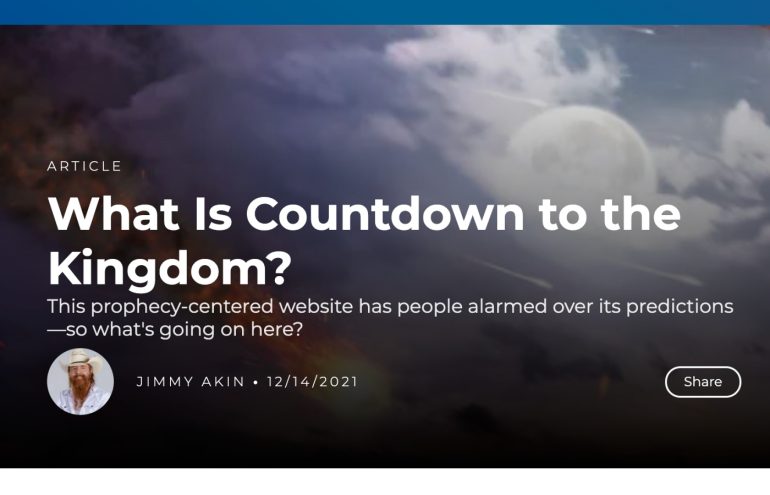

 Alicja Lenczewska
Alicja Lenczewska

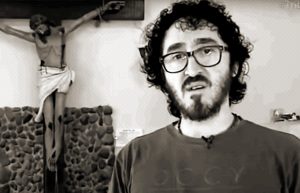
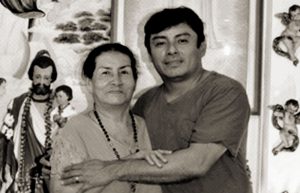
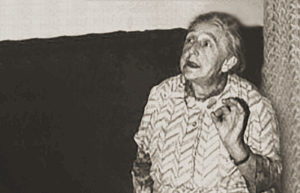 Elizabeth Kindelmann
Elizabeth Kindelmann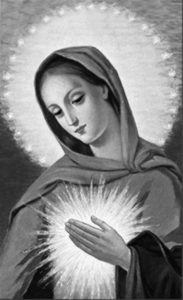 Through what became The Spiritual Diary, Jesus and Mary taught Elizabeth, and they continue to instruct the faithful in the divine art of suffering for the salvation of souls. Tasks are assigned for each day of the week, which involve prayer, fasting, and night vigils, with beautiful promises attached to them, laced with special graces for priests and the souls in purgatory. In their messages, Jesus and Mary say that The Flame of Love of the Immaculate Heart of Mary is the greatest grace given to mankind since the Incarnation. And in the not-so-distant future, her flame will engulf the entire world.
Through what became The Spiritual Diary, Jesus and Mary taught Elizabeth, and they continue to instruct the faithful in the divine art of suffering for the salvation of souls. Tasks are assigned for each day of the week, which involve prayer, fasting, and night vigils, with beautiful promises attached to them, laced with special graces for priests and the souls in purgatory. In their messages, Jesus and Mary say that The Flame of Love of the Immaculate Heart of Mary is the greatest grace given to mankind since the Incarnation. And in the not-so-distant future, her flame will engulf the entire world.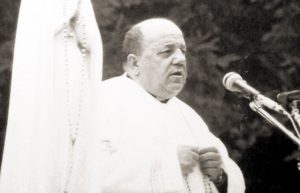 Father Stefano Gobbi
Father Stefano Gobbi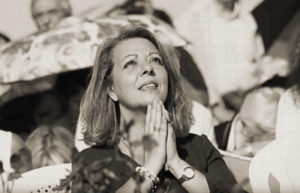 Why Gisella Cardia?
Why Gisella Cardia?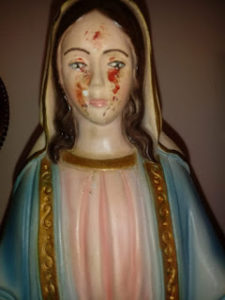 Thirdly, the messages have frequently been accompanied by visible phenomena, photographic evidence found in In Cammino con Maria, which cannot be the fruit of subjective imagination, notably the presence of the stigmata on Giselle’s body and and the appearance of crosses or religious texts in blood on Gisella’s arms. See the pictures taken from her apparition website
Thirdly, the messages have frequently been accompanied by visible phenomena, photographic evidence found in In Cammino con Maria, which cannot be the fruit of subjective imagination, notably the presence of the stigmata on Giselle’s body and and the appearance of crosses or religious texts in blood on Gisella’s arms. See the pictures taken from her apparition website 
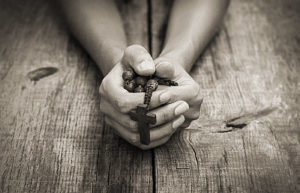 Jennifer
Jennifer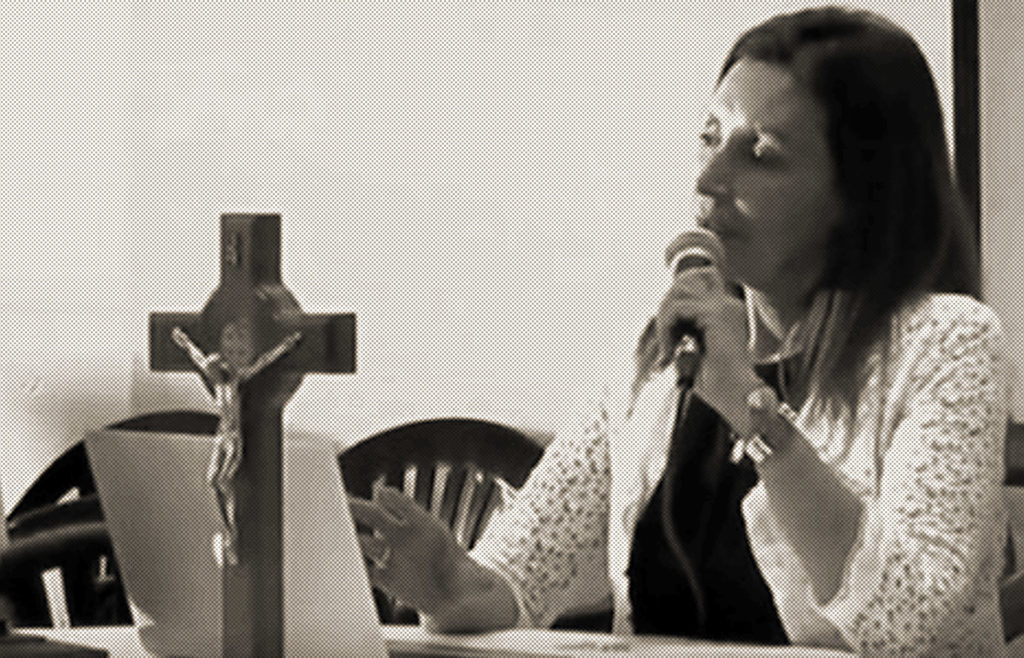
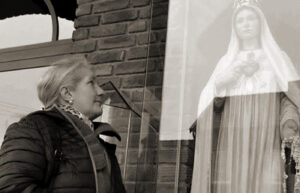 Why Manuela Strack?
Why Manuela Strack?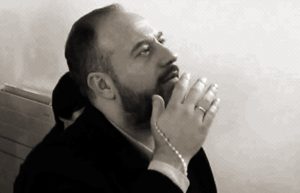

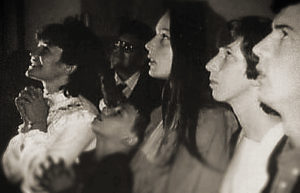 Why the Visionaries of Our Lady of Medjugorje?
Why the Visionaries of Our Lady of Medjugorje?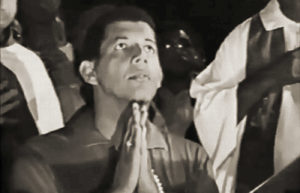 Why Pedro Regis?
Why Pedro Regis?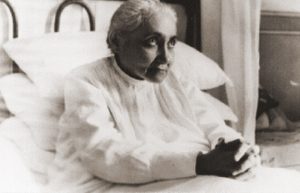 Why the Servant of God Luisa Piccarreta?
Why the Servant of God Luisa Piccarreta? of the saints. It wasn’t until she became a “Daughter of Mary” that the nightmares finally ceased at the age of eleven. In the following year, Jesus began to speak interiorly to her especially after receiving Holy Communion. When she was thirteen, He appeared to her in a vision that she witnessed from the balcony of her home. There, in the street below, she saw a crowd and armed soldiers leading three prisoners; she recognized Jesus as one of them. When He arrived beneath her balcony, He raised his head and cried out: “Soul, help Me!” Deeply moved, Luisa offered herself from that day on as a victim soul in expiation for the sins of mankind.
of the saints. It wasn’t until she became a “Daughter of Mary” that the nightmares finally ceased at the age of eleven. In the following year, Jesus began to speak interiorly to her especially after receiving Holy Communion. When she was thirteen, He appeared to her in a vision that she witnessed from the balcony of her home. There, in the street below, she saw a crowd and armed soldiers leading three prisoners; she recognized Jesus as one of them. When He arrived beneath her balcony, He raised his head and cried out: “Soul, help Me!” Deeply moved, Luisa offered herself from that day on as a victim soul in expiation for the sins of mankind. immobile, rigid-like state that appeared almost as if she were dead. It was only when a priest made the sign of the Cross over her body that Luisa regained her faculties. This remarkable mystical state persisted until her death in 1947—followed by a funeral that was no little affair. During that period in her life, she suffered no physical illness (until she succumbed to pneumonia at the end) and she never experienced bedsores, despite being confined to her little bed for sixty-four years.
immobile, rigid-like state that appeared almost as if she were dead. It was only when a priest made the sign of the Cross over her body that Luisa regained her faculties. This remarkable mystical state persisted until her death in 1947—followed by a funeral that was no little affair. During that period in her life, she suffered no physical illness (until she succumbed to pneumonia at the end) and she never experienced bedsores, despite being confined to her little bed for sixty-four years.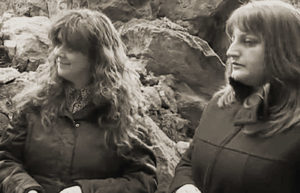 Why Simona and Angela?
Why Simona and Angela?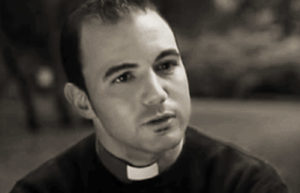
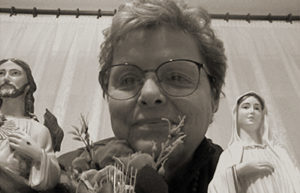 Valeria Copponi
Valeria Copponi